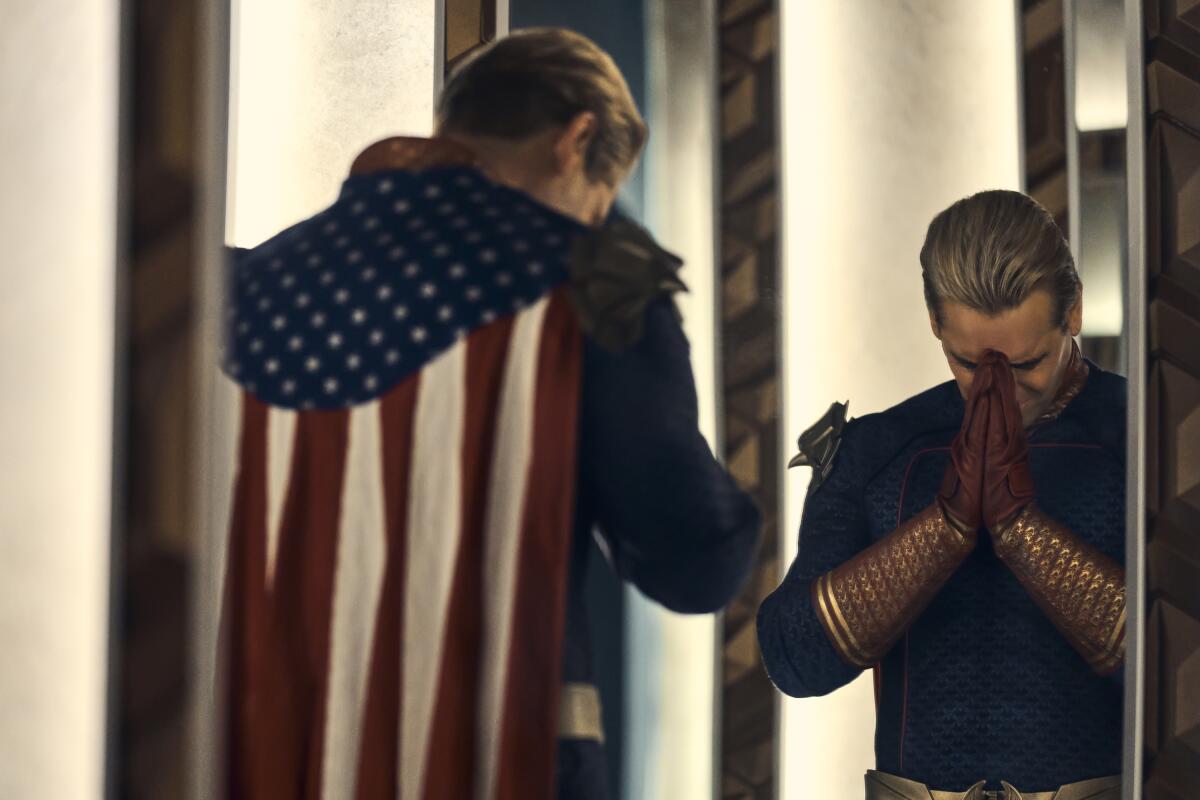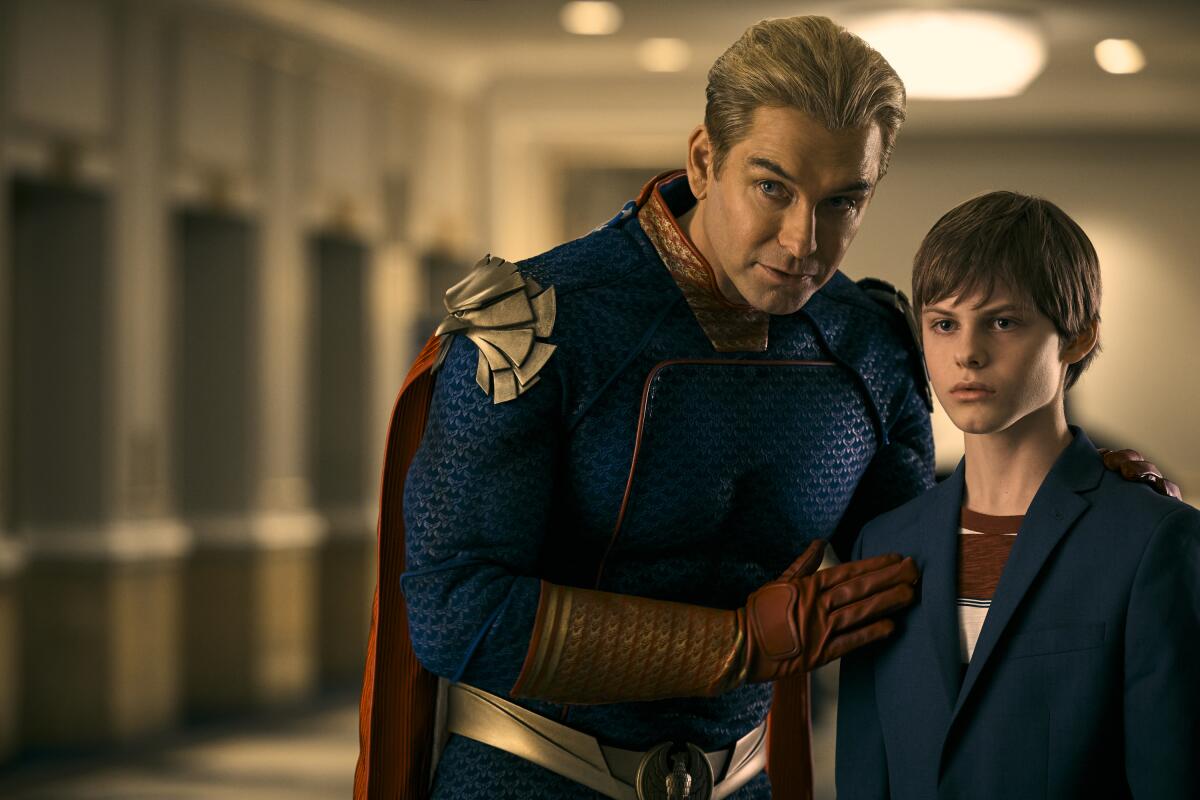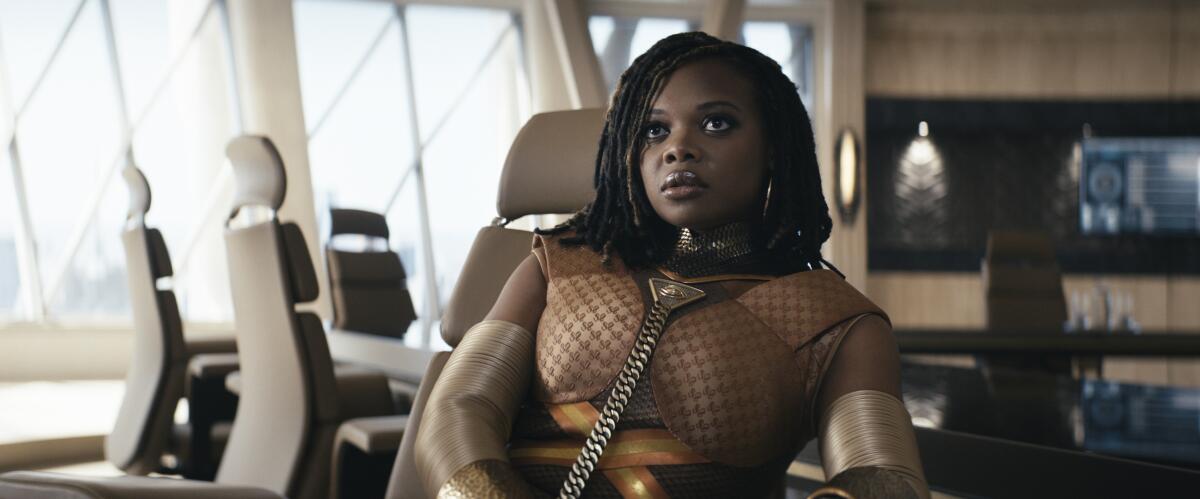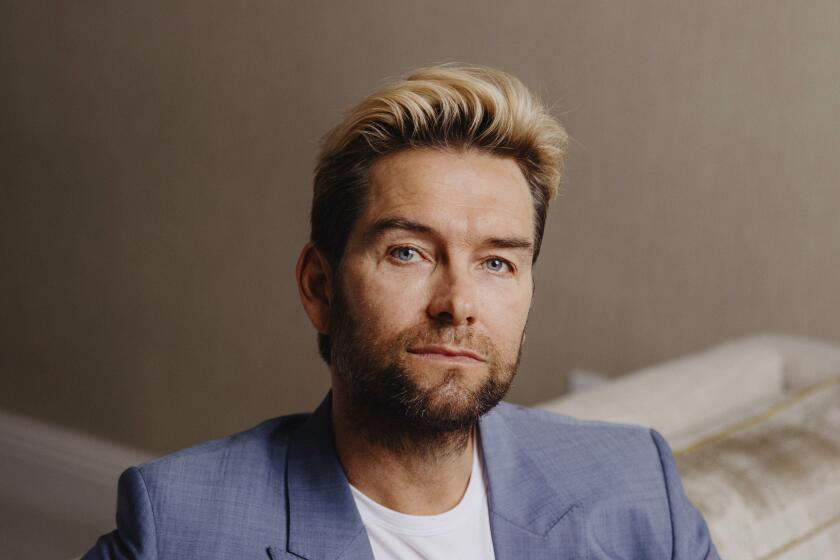‘The Boys’ season finale depicts an assassination. The timing is coincidental, its showrunner says

- Share via
This article contains spoilers for the Season 4 finale of Prime Video’s “The Boys.”
In the finale of this season of “The Boys,” Homelander, the self-obsessed superhero with a desire for all-consuming power, ends up on top. A figurehead president has been elected, putting the supe, played by Antony Starr, essentially in charge of America. One of his cronies, a conservative broadcaster who goes by Firecracker, tears up as she says how they are going to “Make America Super Again.”
Days before this episode dropped, there was an assassination attempt on former President Trump as he was campaigning in Pennsylvania; the finale now airs on the same day as the last night of the Republican National Convention where Trump, whose catchphrase is “Make America Great Again,” formally accepts the nomination. That was a complete coincidence (as is the episode’s title “Assassination Run”). Showrunner Eric Kripke sounded sheepish when he explained in a Zoom call a few weeks ago, with Starr, that the timing of the season finale was not planned.
“What can I say? I’m deeply concerned,” he said. Kripke is not shy about the reference points, adding, “Yes, of course we’re making references to Trump and, in specific, his malignant narcissism and his egomania, and the fact that unlike last time, he’s now surrounded himself with very intelligent people who are going to potentially hand this guy the world and the chances of that are greater than they’ve ever been.”
The episode, which began streaming Thursday, also depicts the killing of a vice president-elect. Kripke did not respond to a follow-up request for comment. A spokesperson for Sony Pictures Television, which produces the series, said it was filmed last year and a title card was added to the start of the episode. It reads: “This episode contains scenes of fictional political violence. Any similarities to recent events are completely coincidental and unintentional. Prime Video, Amazon MGM Studios, Sony Pictures Television and the producers of The Boys oppose, in the strongest terms, real-world violence of any kind.”

But Kripke said that he and Starr were careful not to make Homelander not just a blond replica of Trump in a cape and spandex.
“I’m not there to specifically make fun of anyone,” Starr said. “I just want everything to come from something inside the character.”
Homelander’s ascension arrives as the Prime Video series prepares to wrap up. Kripke announced in June that the upcoming fifth season will be the show’s last, even as the universe of “The Boys” continues to expand with the spinoff series “Gen V.” And with Homelander’s rise comes the fall of the group of anti-superhero vigilantes, known as The Boys, who are rounded up as the hour comes to a close.
“Gen V” showrunner Michele Fazekas and executive producer Eric Kripke talk about the Season 1 finale, the show’s deeper meanings and “handing the football” to Season 4 of “The Boys.”
If the five seasons can be translated into a three-act movie, Kripke said, this is the low point at the end of Act 2, leaving room for our heroes to come roaring back in the series’ conclusion. Thus, Kripke needed something “apocalyptic” to befall the characters.
“I wouldn’t call it a reflection, but I would say this is our worst fear of a pushed version of society,” Kripke said. “I’m not claiming it’s really going to get that bad, but it’s just us expressing our anxiety.”
Or maybe some viewers will view it as a good thing?
“Maybe this will be a really positive, hopeful note to those that haven’t been impressed by the show,” Starr suggested, a reference to viewers who expressed disappointment on social media when the show demonstrated its liberal leanings earlier this year.
Not that “The Boys” hasn’t always been pretty explicit about being a depiction of what happens when America gives into fascist tendencies. In Season 2, for instance, Homelander linked up with Stormfront (Aya Cash), a secret Nazi. But this season, and its conclusion, puts the analogy front and center.
“I would confess to being maybe slightly less subtle this season,” Kripke said. “But I think that’s only because of the way the storyline happens to line up with the real world about a presidential election and coups to get into the White House.”
We sift through the rubble of the Season 2 finale of Amazon’s “The Boys” with Aya Cash, Karen Fukuhara, Antony Starr, Karl Urban and showrunner Eric Kripke.
He noted that those stories were drawn from the comics, which the show is based on, and were first written by Garth Ennis about two decades ago. “What’s the opposite of kismet?” Kripke said. “Just a curse?”
Arguably some of the confusion, if you want to call it that, among former fans has come from the power of Starr’s performance as Homelander. Homelander is very clearly a bad guy. In the pilot of the series, for instance, he downs a plane full of innocent people out of spite. But even though he has superpowers, he’s still human, much to his chagrin. This season, he keeps record of his age by plucking out any gray pubic hairs he finds, placing them in a jar. That plot point was a bit of “amazing synchronicity,” Starr said, because he had been thinking about talking to Kripke about nestling some of his own existential feelings about aging into Homelander. Then he opened up the script to find just that.
Homelander of “The Boys,” has the charm of a politician, the power of a god and the maturity of a tantrum-throwing child. The actor who plays him talks about what makes him lethal and memorable.
Starr described the experience of collaborating on Homelander with Kripke as a “harmonious parenting.” In conversation they casually call the character “Homie.” They sign emails to one another not with “thanks” or “warmly,” but with the word “milk,” sometimes in different languages. (That’s a reference to the fact that Homelander enjoys drinking human milk — most of the time straight from the source, a sign of his immaturity.)
“The ideas that come in are fantastic,” Starr said, as he wore a very un-Homelander Rage Against the Machine T-shirt. “So it’s often a case of just addition: Like, what does that spark in me? And then I kick back to [Kripke].” The collaboration, Starr added, “has benefited the show and the character immensely by two people having such a sense of responsibility to the story, the character, and each other’s creative process and integrity.”
Kripke explained that Starr’s input was invaluable for the fourth episode this season where Homelander returns to the lab where he was raised to torture those who experimented on him. In the script, Homelander was immediately cruel from the start, but Starr suggested a different tactic.
“Ant reached out and said to me, ‘That doesn’t feel totally right to me, because he’s coming home again and when you go home, you revert to whatever you were when you’re home. You’re that innocent kid,’” said Kripke, recalling the conversation. “‘So I think at times he’d be curious and at times he’d be vulnerable, at times he’d be genuinely emotional and then cruel.’”
Together, they went through the material to refine it, and once on set, Starr was free to try different reads of the moments.
“For me personally it was about being really uncomfortable,” Starr said, noting one sequence where he wanted to laugh from a place of pain.

Discomfort is perhaps the place where Homelander most happily lives, especially in the finale. Just before he takes control, he believes his plan has gone completely awry, leaving him with nothing. Instead, his ally Sister Sage (Susan Heyward), the smartest person on the planet, budgeted for his failings. Starr said he would have loved to see what would have happened to Homelander if Sage had not handed him what he wanted.
“It would have been pretty unhealthy,” he said.
Despite his victory, Kripke said Homelander is aware he didn’t earn his success.
“Even if he’s literally king of the world, he’s going to feel inferior about it,” Kripke said. “Ant and I talk a lot about how Homelander is the weakest character on the show, and this is just the knife twist on that.”
At the time of our interview, Kripke has been nailing down the details of the fifth season in the writers’ room and has not brought actors into the process yet. Still, he knows where everyone ends up, and, of course, where they begin. With Homelander, it’s in a place where he can attempt to make the world in his image. Kripke, however, said he is willing to reveal one plot point regarding Homie: “It won’t make him happy. Spoiler alert: He’s still going to be miserable.”
And as for the real world parallels?
“I was hopeful that by the time we got to that finale that we would all feel like, thank God it’s not going to go that way, but I’m no longer as confident,” Kripke said.
More to Read
The complete guide to home viewing
Get Screen Gab for everything about the TV shows and streaming movies everyone’s talking about.
You may occasionally receive promotional content from the Los Angeles Times.








